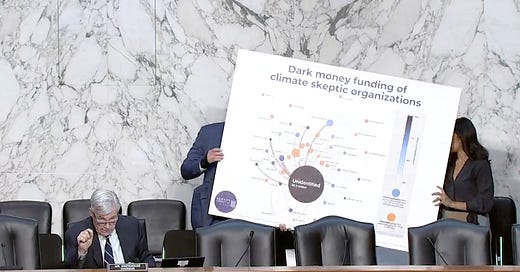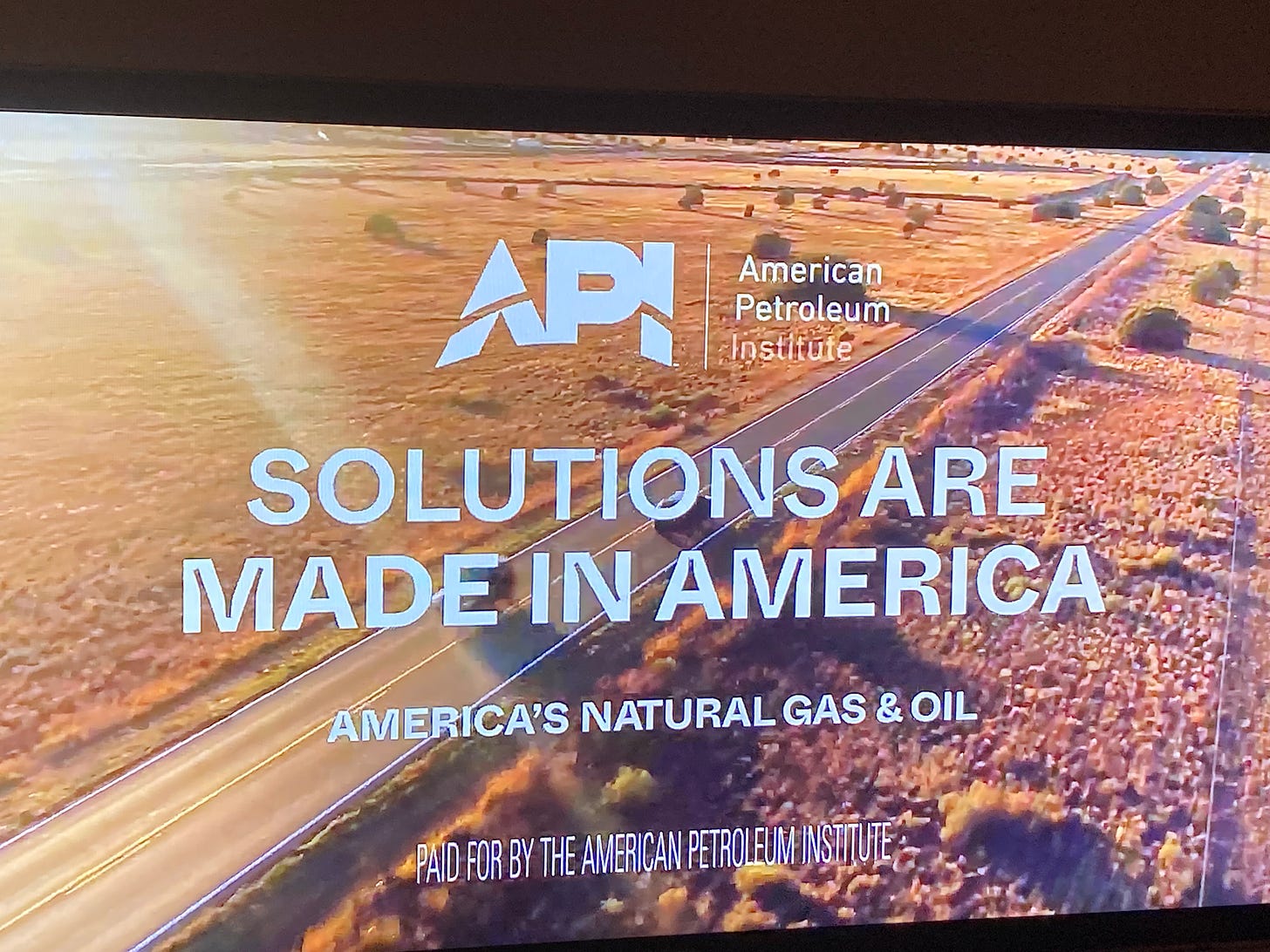The Consequential Climate Cover-up: Congressional Report and Hearing Highlight New Evidence of Big Oil’s Ongoing Efforts to Deceive the Public
Findings from a three-year investigation and subpoenaed industry documents indicate oil companies are still lying about climate change.
A landmark multiyear congressional investigation into the role of fossil fuel companies in obstructing climate action and misleading the public has revealed new findings and insights based on internal industry documents that further support allegations of Big Oil’s ongoing acts of deception.
The findings, detailed in a joint report released April 30 by Democrats from the House Committee on Oversight and Accountability and the Senate Budget Committee, show how major oil and gas companies continue to dodge responsibility for the climate crisis while disseminating disinformation and deploying duplicitous tactics in attempts to preserve their extractive business model and protect their public image.
“Our investigation uncovered public pledges undermined by private memos, public support for climate policies contradicted by private emails, rampant evidence of deception and corporate doublespeak,” Sen. Sheldon Whitehouse (D-RI), chairman of the Senate Budget Committee, said in his opening remarks during a May 1 committee hearing about the new report, titled Denial, Disinformation, and Doublespeak: Big Oil’s Evolving Efforts to Avoid Accountability for Climate Change.
The congressional investigation focused on four of the largest oil majors – Exxon, Chevron, Shell, and BP – as well as two of their biggest lobbying groups, the American Petroleum Institute and the US Chamber of Commerce.
Wednesday’s hearing followed a series of Senate Budget Committee hearings convened by Sen. Whitehouse on the sprawling risks climate change poses across a multitude of economic sectors. It also built upon prior congressional hearings held as part of the investigation into Big Oil and climate disinformation that was launched by Democrats on the House Oversight Committee in September 2021. That committee scrubbed records and references of the investigation from its website when Republicans took control of the House of Representatives after the 2022 midterm elections, but Sen. Whitehouse and his staff then took up the task of finishing what the House committee under Democratic leadership had started, culminating in the new joint report. As Sen. Whitehouse explained at Wednesday’s hearing, more than a million pages of documents obtained through a subpoena had previously gone unreviewed. A small portion of those documents containing some of the most relevant revelations publicly dropped yesterday alongside the report.
According to the joint report, internal documents obtained through the investigation reveal for the first time that companies like ExxonMobil privately conceded that they knew decades ago about the role of fossil fuels in driving climate change, as initially exposed through investigative reporting by Inside Climate News and the Los Angeles Times, yet publicly they attacked the reporting and claimed it was inaccurate. But as the report explains, an Exxon advisor wrote internally in a December 2015 email that the company “didn’t ‘actually ... dispute much of what these stories report.’”
That investigative reporting sparked calls almost a decade ago from Sen. Bernie Sanders and others for a Big Tobacco-style federal probe into Big Oil – particularly ExxonMobil – and catalyzed several state investigations that resulted in lawsuits against Exxon and other major oil and gas companies.
The attorneys general in New York and Massachusetts for example launched multiyear investigations into Exxon that each culminated in suits accusing the company of misrepresenting climate risks. The Massachusetts case is currently in pre-trial discovery, where prosecutors aim to obtain even more evidence and internal documents demonstrating that the company misled investors and consumers. The New York case that charged Exxon solely with misleading investors was dismissed following a trial, but internal documents obtained through the state’s investigation revealed how the company tried to downplay the climate threat during the time when former CEO Rex Tillerson was at the helm, as reported by the Wall Street Journal last September. “Throughout Tillerson’s tenure between 2006 and 2016, Exxon executives in their internal communications attempted to push back against the notion that humans needed to curtail oil and gas use to help the planet—despite the company’s public statements that action was needed,” the Journal reported.
This kind of mismatch between what oil companies say publicly and what they privately admit or discuss is detailed with multiple examples in the new joint report.
While Big Oil publicly promotes fossil gas as climate-friendly and touts its investments in technologies like carbon capture and storage and algae biofuels, for example, private communications indicate that these entities know that gas, CCS, and algae are not real climate solutions, according to the report.
Big Oil also publicly professes to support the Paris Climate Agreement and the aim to achieve net zero emissions, but internally companies recognize they could not meet these goals. Companies admit internally to promoting a prolonged future for oil and gas despite their public pledges to meet various emissions reduction targets, and they or their trade associations stealthily lobby against climate measures like carbon pricing and methane regulations that they claim to support.
“We consistently found the oil and gas companies relied on trade associations like the American Petroleum Institute and the Chamber of Commerce to spread misleading narratives to the public and to lobby politically against effective climate solutions that they pretended to favor,” Rep. Jamie Raskin, a Democrat from Maryland and Ranking Member of what is now called the House Committee on Oversight and Accountability, said during Wednesday’s hearing.
I reached out to several of the Big Oil entities targeted by the investigation. Shell did not immediately respond and Chevron referred me to API’s response. In its response, the Big Oil trade association dismissed the congressional report and hearing as “unfounded election year rhetoric.”
“America’s energy workers are focused on delivering the reliable, affordable oil and natural gas Americans demand while scaling the next generation of low-carbon technologies like hydrogen and carbon capture, and any suggestion to the contrary is inaccurate,” an API spokesperson said in an email.
As I have previously reported based on reviewing some of the internal industry documents obtained through this investigation, Big Oil primarily views carbon capture technologies not as some climate savior, but as a method for continuing to produce oil and gas long into the future. And the expectation that CCS can scale at a fast enough rate to have any potential relevance to climate mitigation – which would entail reaching gigaton-scale by 2030 – is a gigantic gamble.
The joint report sets the record straight about oil and gas companies’ purported commitment to scaling carbon capture technologies: “The companies’ massive public-facing campaigns portray CCS as a viable and available solution to increasing greenhouse gas emissions, but the companies acknowledge internally that they are not planning to deploy the technology at the scale needed to solve the warming crisis…The fossil fuel industry recognizes that the rollout of CCS at scale is moving too slowly to reach net zero emissions by 2050 and that the reason is their own extremely modest investment, but their public claims conceal this reality.”
Four Stages of Big Oil’s Engagement on Climate
As explained during Wednesday’s hearing, the oil industry’s decades-long efforts to evade accountability for their products’ impacts on the climate covered four phases.
The first was the “they knew” phase, whereby fossil fuel companies studied the climate problem internally and learned about the damaging consequences their products could bring about for society. “By the 1960s, before Neil Armstrong even walked on the moon, the science of global warming was well understood by Big Oil,” Rep. Raskin testified.
However, as Raskin continued, “instead of acting like Paul Revere in sounding the alarm about climate change, they acted like the Maleficent the evil fairy in Sleeping Beauty and cursed everyone to try to go asleep for 100 years.” That brings us to stage two – the “scheming” phase, whereby the fossil fuel industry planned out its operations to attack climate science and block policies and regulations to rein in greenhouse gas emissions. “From the late 1980s, oil companies and their trade associations - variously abetted by front groups as well as PR consulting and even law firms - have waged a multi-decade, multi-billion dollar campaign of disinformation, lobbying, propaganda, and the colonization of academia to sabotage science, scare and confuse the public and politicians, and undermine climate and clean energy policies,” Geoffrey Supran, a scholar of Big Oil’s propaganda and disinformation and director of the Climate Accountability Lab at the University of Miami, explained in his testimony.
The third phase was the “hoax” phase, whereby companies and their trade associations and front groups disseminated overt climate denial. This phase included funding contrarian scientists and economists as well as climate denying politicians, Supran noted.
Finally, the fourth phase that continues to this day is all about delay and duplicity, whereby the industry claims to be working on climate solutions when in reality it has no real plans to transform its business model. “Phase 4 is nominally expressing alignment with the Paris Agreement climate goals while internally making them unachievable,” Sen. Whitehouse said. “Phase 4 is advertising your interest in climate-safety technologies but refusing to put the investments behind them to make them real. Phase 4 put simply is ‘climate denial light.’”
Striking Parallels to Big Tobacco
The hearing also highlighted the similarities between the tobacco industry and the oil industry, both in terms of their deceptive strategies and in government efforts to hold the industries accountable.
“Big Oil is frankly the new Big Tobacco,” Supran said.
Sharon Eubanks, who led the US Department of Justice’s landmark successful civil racketeering case against big tobacco companies, spoke to the comparisons between the two industries. “Both industries lied to the public and regulators about what they knew about the harms of their products and when they knew it,” she said.
“During our probe I’ve been struck by the parallels between Big Oil’s aggressive denialism about climate change and the tobacco industry’s suppression of the truth about tobacco addiction and the carcinogenic effects of smoking,” said Rep. Raskin. He noted that the fossil fuel industry is currently facing multiple lawsuits brought by states, municipalities, and tribal governments seeking to hold companies like Exxon liable for their deceitful conduct.
The Climate Cover-up Has Real Consequences
Ultimately, the decades of denial and disinformation about climate risks is a big reason society now faces a climate emergency. The industry’s plan to delay climate action has largely been successful; the Intergovernmental Panel on Climate Change acknowledged in its latest scientific assessment that obstruction from vested interests has effectively delayed climate action worldwide.
That has real costs for people and the economy. A recently published study in Nature finds that global annual damages from climate change could amount to $38 trillion by 2049, warning that the world economy is committed to an income reduction of 19% over the next 26 years. The economic damages already outweigh climate mitigation costs, the researchers say. And as Supran mentioned during Wednesday’s hearing in responding to a question from Sen. Sanders, economists who have studied this have estimated that by around 2030 the consequences of global warming could include a $240 billion COVID-like economic shock every five years.
Yet Big Oil continues to rake in massive profits and benefits from billions of dollars in government subsidies. As Rep. Raskin said in a video clip shown at the beginning of the hearing: “It’s time for America to hold Big Oil accountable.”





